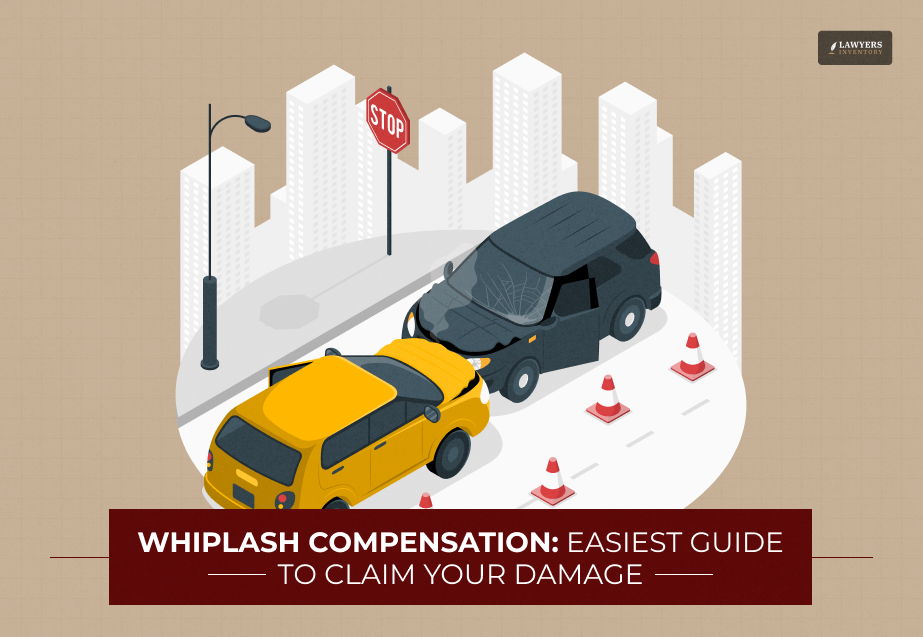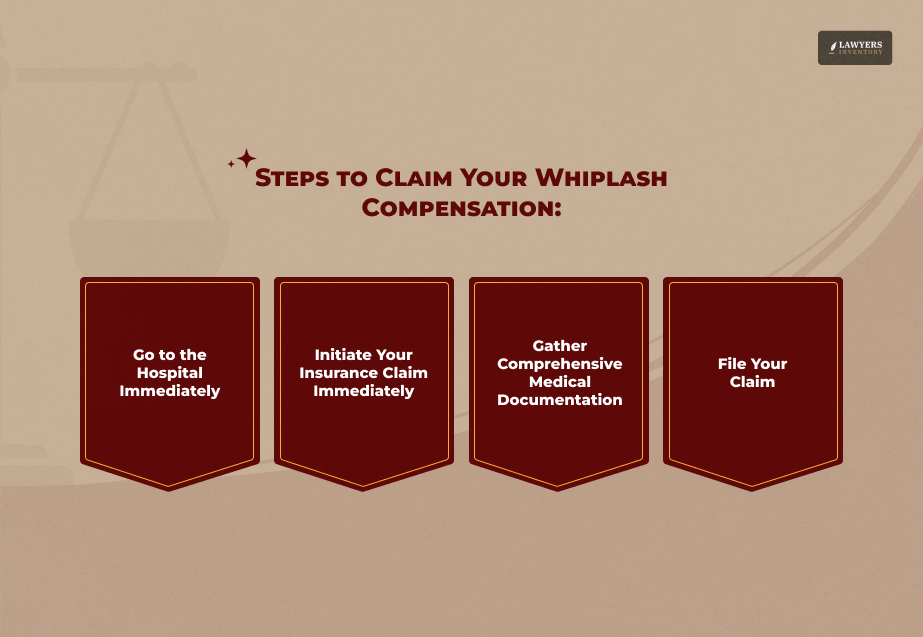
Car accidents are more common than you think! And among the several other types of injuries that one might get as a result of this is whiplash. Needless to say, most people try to understand how to claim their whiplash compensation.
“But it’s just a minor sprain in the neck! Do I really need to file for compensation?”
Umm… yes, you do!
You see, whiplash leads to a range of health issues. These health problems could linger anywhere from a few months to several years.
Eventually, as time passes, this makes it challenging to work to support your family and enjoy the other facets of your life. These problems could be costly to address as well and call for both physical treatment and drugs.
But guess what? This is where your right to file a claim for whiplash compensation comes into play!
If another driver’s negligent or deliberate conduct caused your injury, fortunately, you could make an insurance claim to get paid for all the damages, medical expenses, lost income, and pain and suffering.
But how can you claim your rightful whiplash compensation?
Hi. In today’s blog, this is exactly what I am going to explain. So, if you have recently suffered an accident, keep on reading till the end and thank me later…
How Can You Claim Your Whiplash Compensation?

Whiplash injuries are the ones that generally involve soft tissue injuries. And trust me when I say this, most people take these lightly!
Most insurance companies tend to see whiplash claims with skepticism. And that’s regardless of the facts of the case.
Which is why it is important that you know the right steps to file for your whiplash compensation.
If you are planning to claim your lawful compensation for whiplash and want to provide a really strong basis for your case, I have you covered!
Here are some of the things that you need to do:
Go to the Hospital Immediately
Even if you do not feel pain or have cause to assume you were wounded, if you were in a significant vehicle accident, you should seek medical attention right away. Some whiplash injuries induce pain and other symptoms hours or days apart.
The treating doctors will know whether they should search for whiplash indicators when you bring up the damage. For example, in a rear-end collision, they will almost definitely look for whiplash symptoms.
Apart from identifying your ailment, the doctor might be able to rule out past medical illnesses as the source of your damage.
A good personal injury claim depends on this since lawyers for the defendant and insurance companies will search for any justification to attribute your injury to something other than the accident.
Another reason you should visit the hospital immediately following the accident is that waiting often makes insurance companies, courts, and juries suspicious of you submitting a false claim simply to collect money.
With any personal injury claim, especially one involving whiplash, you should do all you can to prove that the collision resulted in an injury and that you are pursuing a valid claim.
Initiate Your Insurance Claim Immediately
Since insurance firms may have submission deadlines, start a claim immediately to avoid missing the deadline.
Most states handle insurance claims following car accidents using a fault-based system. Consequently, the at-fault person is liable for all damages resulting from the accident.
One can nevertheless get in touch with your insurance provider. To get paid, your insurer will simply contact the other driver’s insurance.
The average whiplash settlement will depend on your state’s laws, the severity of your injury, and the impact it has had on your life.
Gather all necessary documentation and evidence to support your claim and negotiate a fair settlement with the insurance company.
Follow the Prescribed Treatment Plan
After the diagnosis of your injury, the doctor could prescribe medicine and offer additional advice on how to treat it, such as seeing a specialist, planning medical tests, and restricting particular activities.
Following the doctor’s instructions should be something you do aggressively. This accelerates your healing and emphasizes the gravity of your circumstances.
Additional medical therapy can expose other ailments or demonstrate the actual degree of your whiplash damage. Your personal injury claim may be more profitable the more serious your injuries are.
Gather Comprehensive Medical Documentation
Among the most valuable sources of proof in a personal injury lawsuit are medical records. You must have documentation of every doctor’s appointment, especially your first one following an injury. These records will indicate your diagnosis and the doctor’s notes on your visit.
You should also gather documentation proving your medical state in the weeks and months preceding the collision.
These rule out a previous ailment as the origin of your damage. Get copies of MRIs, X-rays, CT scans, blood test findings, medications, and any other tests or treatments you have had.
You also want thorough records of every expense your injury generates. Save all doctor’s visits, medical test receipts, and costs. Should your claim be approved, you should be paid to pay all those different charges.
The Claim Process
Your treating doctors will search for whiplash symptoms to document if you submit a personal injury claim.
Medical documents must back all the injuries you claim in your personal injury lawsuit, or you risk insurance adjusters seeing your ailments with mistrust.
Furthermore, understand how crucial it is to begin your claim process and treatment as soon as you are involved in an accident to maximize your financial recovery.
The at-fault driver’s insurance company will take your claim more seriously the sooner you submit it. Starting the claims process does not always guarantee getting a settlement earlier.
Before you seek reimbursement for all the injuries you have sustained from the accident, you have to complete thorough therapy and grasp the full extent of your injuries.
Bonus: Best Practices to File a Car Insurance Claim After an Accident
Several best practices apply to submitting an automobile insurance claim. Some of them are as follows:
Contact Your Insurer
Tell the insurance you were in an accident. Once you do that, you should provide them with all the necessary details. These include the following:
- Date.
- Time.
- Collision site.
One may also remark that you are under medical treatment right now.
Refrain from Negotiation Without a Lawyer
Offer no ideas! It is advisable not to express your thoughts regarding the crash or your injuries. Your medical records and police reports include all the details regarding the collision and your injuries.
Don’t Disclose Severity of Injuries
The insurance adjuster can question how much pain you are in and how severe your injuries are. Therefore, I would really advise you to avoid trying to explain the degree of your injuries.
Claimants sometimes underplay the degree of their injuries or the degree of agony they are going through, though. You can gently turn down inquiries concerning this.
Don’t Admit Anything
Admit nothing. I repeat, do not admit anything.
But why?
Well, it is true that even if you are somewhat at fault, you will not be deprived of your entitlement. Still, you should not own mistakes.
Rather, you have to let the claims process run through. The case’s facts will decide your degree of liability.
Avoid Independent Medical Examination
Finally, no matter what happens, refrain from agreeing to an independent medical examination; you will only be obliged to do this if you submit a claim with your insurance provider.
The insurance company chooses the independent medical examiner because he or she will act in their best interest.
How Much Compensation For Whiplash Can You Get?
Now, when it comes to claiming your whiplash injury compensation, let me tell you something: the amount can vary.
Yes. The whiplash settlement payouts in the United States can range from a few thousand dollars to even over a million. (You read that right: a million).
However, it all depends primarily on one thing: the severity of your injury.
In most cases, this is what the whiplash settlement amount looks like:
- Mild whiplash: $5,000 to $15,000
- Severe whiplash: $10,000 to $100,000
Here are some of the factors that influence the compensation amount for whiplash injuries. These are as follows:
- Severity of injuries.
- Medical expenses.
- Lost income.
- Fault and negligence.
- Pain and suffering.
- Jurisdiction and location.
Wrapping It Up!
While minor injuries and small insurance claims could seem simple, serious whiplash injuries can result in complicated situations that could be challenging for you to negotiate on your own.
Often, these circumstances include significant medical expenses and time away from employment, which can also cause financial difficulty.
One can benefit by consulting a whiplash car accident claim experienced attorney. If possible, do this before you talk to the other driver’s insurer.
Read Also:
- How Pre-Existing Conditions Impact Compensation in Car Accident Cases
- What Compensation Can You Recover After a Motorcycle Crash?
- How To Maximize Your Workers’ Compensation Settlement











0 Reply
No comments yet.